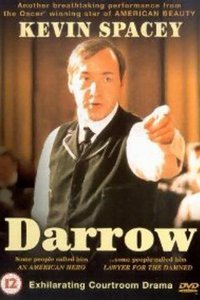Darrow (1991)

In the US, Clarence Darrow is famous as the lawyer who argued the Scopes Monkey case, which led to the teaching of evolution in the public school system, but his life and work is perhaps unfamiliar to viewers elsewhere in the world. Rather than focus on his most infamous trial, this film explores Darrow’s life prior to that point, showing his evolution from corporate lawyer to champion of the underdog and passionate opponent to the death penalty.
The film opens in late 19th century Chicago with former Iowa farm boy Darrow (a truly magnificent Spacey) defending the railroads against the creeping tide of unionisation. But Darrow is conflicted by his own support for the railwaymen, who are only trying to argue for safer working practices and a decent wage. When his bosses collude to frame union leader Eugene Debs (Cooper), Darrow tenders his resignation and takes up the defence of Debs.
The film charts his highs and lows from this point, defending a number of union-based cases and the Leopold and Loeb murder case (which has proven the basis of many films, including Hitchcock’s Rope and 2002’s Murder By Numbers). It’s a by-the-numbers approach to the life of Darrow, covering all the major cases in only glossy detail and focusing on the man himself. The filmmakers can count themselves lucky that they landed an actor of Spacey’s calibre before he became a star and they couldn’t afford him.
Spacey’s in almost every scene and it’s a good thing too, as his performance helps to hide deficiencies in the script which somehow contrives to try and make this fascinating man’s life less than interesting. As befits a man of considerable eloquence and erudition, the court-room scenes feature snippets taken from the actual transcripts of Darrow’s trials. The Leopold and Loeb case, in particular, in which the real-life Darrow argued in the face of overwhelming public and political opposition for 12 gruelling hours that the accused should not face the death penalty, allows Spacey to grandstand on a basis not usually seen outside classical theatre:
I am pleading for the future; I am pleading for a time when hatred and cruelty will not control the hearts of men; when we can learn by reason and judgement and understanding and faith that all life is worth saving, and that mercy is the highest attribute of man.
Worth watching just to see both Kevin Spacey give notice to the movie world that his was a talent to watch, but bolstered by fine support by both Cooper (himself an Oscar-winner in 2003 for The Hours) and Wilson (writer of 2002’s controversial Secretary), as the understanding wife. But, if either the script or the curiously detached direction could have matched the truth of the performances or the eloquence of Darrow, this would have been unmissable.
Added on 13 May 2019:
When this was written, Kevin Spacey was known only for his acting. I stand by the review and my opinions on his performance. That shouldn’t be taken as endorsement of him as a man.